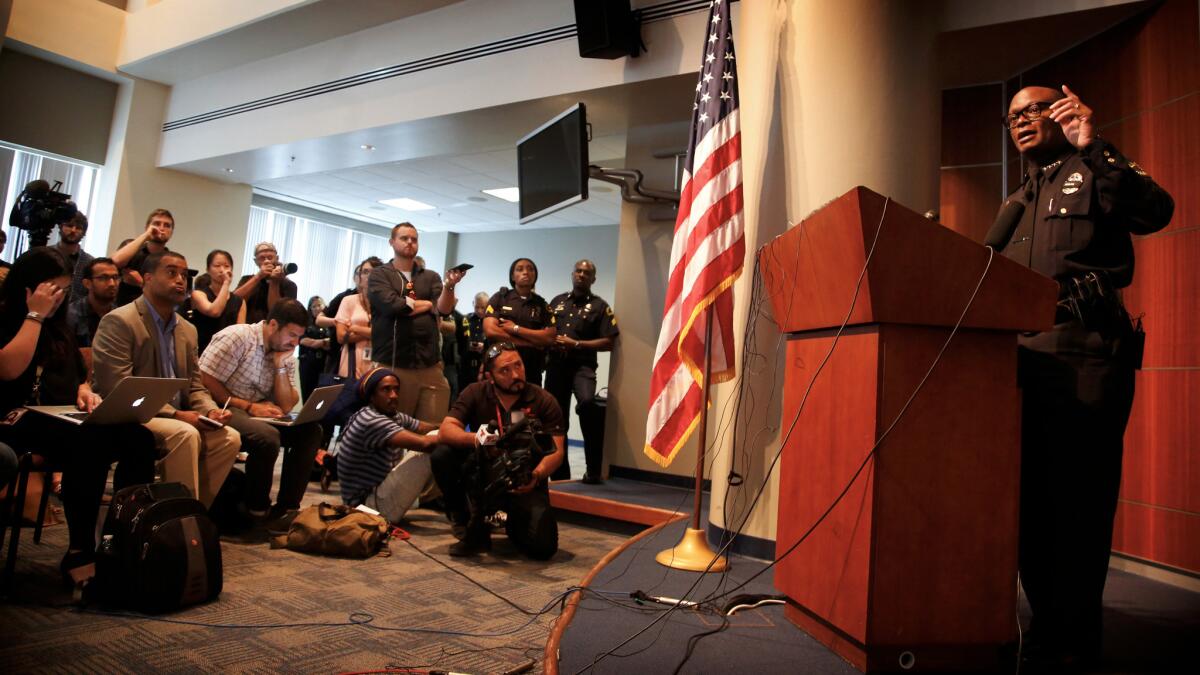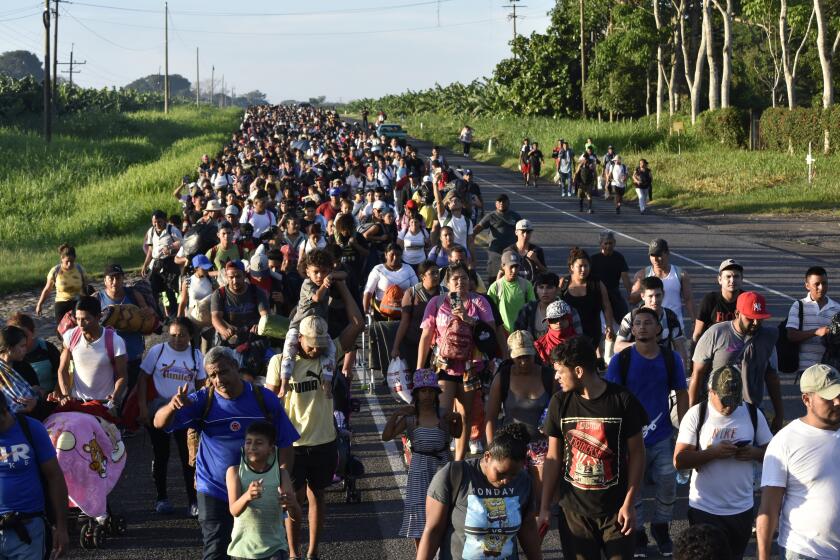Dallas police chief: Open carry makes things confusing during mass shootings

Reporting from Dallas — Texas has always prided itself on its vigorous exercise of the 2nd Amendment. The state has long allowed the open carrying of rifles, and this year it joined a majority of other states in allowing handgun owners to carry their weapons openly.
But the presence of up to 30 people carrying rifles during a protest last week at which 12 police officers were shot complicated law enforcement’s attempts to identify the gunman, Dallas Police Chief David Brown said Monday.
The armed protesters also were wearing camo gear, bulletproof vests and gas masks, police said.
“We’re trying as best we can as a law enforcement community to make it work so that citizens can express their 2nd Amendment rights,” Brown said.
“But it’s increasingly challenging when people have AR-15s slung over their shoulder and they’re in a crowd,” he said. “We don’t know who the good guy is versus the bad guy when everyone starts shooting.”
Thursday’s shooting, which left five officers dead, erupted during a protest against recent shootings of African American men by police officers in Louisiana and Minnesota.
The gunman, Micah Xavier Johnson, a 25-year-old Army reservist, told police negotiators he was targeting white officers.
Some gun rights advocates have argued that armed citizens, so-called good guys with guns, can aid police in combating crime. Last year, Texas passed its law allowing the open carrying of handguns, and a law allowing people to carry handguns on college campuses is set to take effect Aug. 1.
Advocates for open carry laws rejected the idea that the presence of the armed men at last week’s protest caused any confusion.
“The fact is that there is ample evidence on social media that law enforcement was not confused during the shooting about who was a good guy and who was a bad guy with a gun,” C.J. Grisham of the group Open Carry Texas said in a statement.
“Video evidence is clear that officers felt quite at ease during the incident in the presence of open carriers,” he said.
But Brown called policing with open carry “difficult at best.”
He called on lawmakers to do “something on guns,” though he emphasized that as a police chief, he didn’t want to “get in that debate and get swallowed up by both sides who are entrenched in their positions – I want no part of that.”
He said lawmakers need to do their job. “We’re doing ours,” Brown said. “We’re putting our lives on the line. The other aspects of government need to step up and help us.”
The chief said police are questioning Johnson’s family members, including his mother, to determine whether he had any accomplices.
Johnson kept a journal of “combat tactics,” stockpiled bomb-making materials and other weapons, took a self-defense class and was seen by neighbors practicing military exercises in his backyard, officials have said. Records show he lived with his mother.
How could his family not have known? “That’s my question,” Brown said at Monday’s news briefing . He said Johnson’s relatives have been cooperative and have not been detained.
“I want to make sure there’s nobody else out there who had anything to do with this,” Brown said. Detectives are reviewing more than 300 statements to determine which witnesses and officers need to return for further interviews, he said. In the coming days they plan to release a timeline of the gunman’s movements.
We don’t know who the good guy is versus the bad guy when everyone starts shooting.
— David Brown, Dallas police chief
Johnson was killed remotely by police using a robot carrying explosives after a standoff of several hours.
This was the first time Dallas police had used a robot, normally used to defuse bombs, in such a situation. The department bought the Mark V-A1 eight years ago for $151,000.
“They improvised this idea in about 15, 20 minutes,” he said. “I asked the question of how much we were using. I said, ‘Don’t bring the building down.’ I said, ‘I trust you, you know what I want done.’ ”
The chief weighed using the robot or a sniper to end the standoff, but said during an interview with CNN on Sunday that the robot was safer.
Brown said that Johnson had hidden in a corner in the garage and that using a sniper would have exposed police to “great danger.”
“We believe that we saved lives by making this decision,” he said.
“He said he was going to kill. This wasn’t an ethical dilemma for me,” Brown said. “And I’d do it again, to save our officers.”
“There’s partial damage to the extension arm of the robot, but it is still functional if we had to use it for other operations,” he said.
Brown said evidence seized from the gunman’s home indicates he had originally been planning an even bigger attack. Just how big remains unclear.
“There was a large stockpile [of explosives]. One of the bomb techs called me at home to express his concerns about how large a stockpile he had,” Brown said.
He said it also wasn’t clear how Johnson learned about bomb making.
“We don’t think he learned it in the military. He learned it online, I guess,” the chief said.
A candlelight vigil for the fallen officers was planned at City Hall on Monday night, and visitation has been scheduled for three of the officers at funeral homes Tuesday, with funerals Wednesday.
The funeral of Dallas Area Rapid Transit Officer Brent Thompson, 34, will be held at 10 a.m. Wednesday at the Potter’s House Church, a Dallas megachurch run by Bishop T.D. Jakes. The funeral of Dallas Police Senior Cpl. Lorne Ahrens, 48, is scheduled for 11 a.m. at Prestonwood Baptist Church in nearby Plano. The family of Sgt. Michael J. Smith, 55, has scheduled a private funeral at Mary Immaculate Catholic Church in nearby Farmers Branch and a ceremony for fellow officers and the public at noon Wednesday at Dallas’ Watermark Church, where he provided weekly security for years.
Funeral arrangements were still pending Monday for Officers Michael Krol, 40, and Patrick Zamarripa, 32, according to a statement from Dallas police.
The chief said he was still trying to come to terms with the fact that they’re holding these funerals. “I don’t know how I’m going to make it through the week,” he said.
More to Read
Sign up for Essential California
The most important California stories and recommendations in your inbox every morning.
You may occasionally receive promotional content from the Los Angeles Times.











